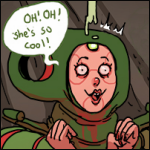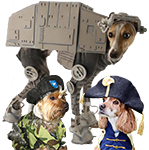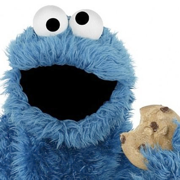|
Something Else posted:Any artist whose work is included in the corpus for a machine learning algorithm should receive a license fee and royalty That’s an excellent way to make sure no one makes machine learning algorithms.
|
|
|
|

|
| # ? Jun 4, 2024 04:03 |
|
Kalman posted:That’s an excellent way to make sure no one makes machine learning algorithms. good
|
|
|
|
Kalman posted:It’s not a direct copy like a sample, so for copyright purposes it’s totally different. Samples aren't direct copies either, they're manipulated.
|
|
|
|
pseudorandom name posted:Samples aren't direct copies either, they're manipulated. Samples are direct copies - their additional manipulation is derivative of the direct copy. That’s why you can re-record a song and not infringe the sound recording copyright - even though you’re making the same(ish) sound, independent recreation is permissible. Copyright doesn’t cover soundalikes and lookalikes absent direct copying or direct derivation. ML output does not directly copy an original image and thus is not covered by copyright, even if it “learned” from that image. You can argue that it should be a copyright issue, but right now it isn’t. (In the US, can’t speak for other jurisdictions.). The fact that something might be “in the style of X” doesn’t mean it infringes X’s copyright.
|
|
|
|
If i put a hundred paintings by an artist up on a wall and think very hard about them then make another painting in the same style i don't have to pay royalties.
|
|
|
|
If you trace them you could
|
|
|
|
There's no way to express this, I think, without sounding like a Luddite, and I am not that. But I am someone who cares a lot about visual art and a hobby artist. When you look at a painting, it matters that it's a painting, that someone learned the skill to make it. You see the brush strokes, you can imagine the artist creating it. Or looking at digital art, even; someone *made* that, a human person made it to express something and when you look at it, there's a meeting of minds, and they speak to you through the art. Even if the art is bad or trivial or stupid. The AI can't do that. It just splats down something that looks a bit like what it's meant to look like. But it doesn't *mean* anything. There's no expression, no intent. It's the visual-art equivalent of lorem ipsum. It resembles art but without artistic intent, it's not art. Sebmojo, if you did that thing, looked at paintings, thought about them and then painted something in a similar style, that would still be art because it would be you, a person with a mind, trying to express something creatively. But a lot of people don't give a gently caress about any of this so I guess they'll be all right.
|
|
|
|
call me when the machine is actually thinking about the artworks it's being fed, rather than simply harvesting raw visual data
|
|
|
|
Kalman posted:Copyright doesn’t cover soundalikes and lookalikes absent direct copying or direct derivation. Blurred Lines suggests otherwise.
|
|
|
|
Ivypls posted:call me when the machine is actually thinking about the artworks it's being fed, rather than simply harvesting raw visual data which doesn't mean I disagree with you...
|
|
|
|
If your "work" is produced by an object without a soul then it's worthless garbage that does nothing but crowd out actual beauty in this world.
|
|
|
|
Lotsa arguments here that share similarities with those brought to the fore arguing that photography couldn't be art. To be clear, I'm not taking a position.
|
|
|
|
The art of photography is on the composition not the objects captured
|
|
|
|
Gaius Marius posted:If your "work" is produced by an object without a soul then it's worthless garbage that does nothing but crowd out actual beauty in this world. I personally won't buy any art unless the artist provides proof of the existence of their soul first.
|
|
|
|
quick-turnaround commission spadework pays the bills for a lot of creatives so they can work on stuff they are actually passionate about which is good, imo, given the absence of a strong and resilient social state no good artist is gonna forget to be good because they had to take a $50 commission to draw someone's Phantasy Star OC so they could afford groceries it's worth being concerned about the possibility of a robot killing the $50 OC-drawing market
|
|
|
|
Gaius Marius posted:The art of photography is on the composition not the objects captured The composition *incluides* the objects captured. The objects captured are frequently deliberately composed by the photographer. 
|
|
|
|
No. No more dancing! posted:I personally won't buy any art unless the artist provides proof of the existence of their soul first.
|
|
|
|
Must it be their soul, or could it be someone else's soul in their body?
|
|
|
|
|
silvergoose posted:Must it be their soul, or could it be someone else's soul in their body? thats copyright infringement
|
|
|
|
PupsOfWar posted:thats copyright infringement Report them to Jod.
|
|
|
|
Phanatic posted:Blurred Lines suggests otherwise. Blurred Lines was about copying of the underlying composition, not the sound recording, which works somewhat differently. It was also a terrible decision that has resulted in old artists (or their estates) being able to extract money from new ones, so maybe let's not try to recreate that regime elsewhere. Gaius Marius posted:The art of photography is on the composition not the objects captured "The art of AI-generated art is in the prompt generation, not the objects depicted."
|
|
|
|
Kalman posted:Samples are direct copies - their additional manipulation is derivative of the direct copy. That’s why you can re-record a song and not infringe the sound recording copyright - even though you’re making the same(ish) sound, independent recreation is permissible. Copyright doesn’t cover soundalikes and lookalikes absent direct copying or direct derivation. The bits of the input image were copied and manipulated into the ML model, making the ML model a derivative work of every single input image, and the bits of the ML model were copied and manipulated into the output, making the output a derivative work of the ML model and by an extension a derivative work of the original input images.
|
|
|
|
pseudorandom name posted:The bits of the input image were copied and manipulated into the ML model, making the ML model a derivative work of every single input image, and the bits of the ML model were copied and manipulated into the output, making the output a derivative work of the ML model and by an extension a derivative work of the original input images. That's neither how U.S. copyright law nor machine learning models/output work. The ML model doesn't contain a copy of the works, and the kind of manipulation you're talking about doesn't qualify as derivation. And then on the other end, the bits of the ML model aren't part of the output, nor does the output of a ML model count as a derivation of the model. By your logic, images created in Photoshop would belong to Adobe.
|
|
|
|
sebmojo posted:If i put a hundred paintings by an artist up on a wall and think very hard about them then make another painting in the same style i don't have to pay royalties. This is because internalizing another artist's work and synthesizing a new product is a creative action, which a computer is not currently capable of; Zima Blue this ain't. If you did the thing you described, you would still be producing original artwork, even if it were strongly influenced by your sample artist of choice. You would be making decisions about what aspect of each painting to include or exclude, consciously or not, in addition to the random elements added by your reproduction process - your paints wouldn't be the same, you might have a motor tremor that affects your brush handling, you've got a foot fetish and that changes the framing of your compositions, etc. Your work would likely be criticized as derivative of the original artist, and that might impact both your success and whether or not anyone gave you the time of day. Or you might be the next Lichtenstein, raking in critical acclaim and millions of dollars off of exactly the kind of reproductive process you're describing. Who knows, fine art is bullshit. What AI art does is comparable to taking paintings directly from an artist before they can be sold, running them through an industrial blender, and feeding the colorful canvas pulp into a mold that got photoreproduced off a Kinkade print. In fairness, you could argue there might be artistic merit if this were in a gallery space and the viewer was being confronted with the process as the art itself, but it's not. It's entirely a commercial endeavor - insert someone else's images, get cheap knockoffs. To bring this back around to fiction, Kevin J. Anderson is unquestionably a derivative hack. He's also actually produced a creative work, mostly by himself. If he literally published a Madlib you wrote with the blanks filled in with "ultraspice" and "Paaulo" and so on, that would not be an original work of art, and he would be profiting off your labor. pseudorandom name posted:The bits of the input image were copied and manipulated into the ML model, making the ML model a derivative work of every single input image, and the bits of the ML model were copied and manipulated into the output, making the output a derivative work of the ML model and by an extension a derivative work of the original input images. Transformative and derivative works are established in laws based around the assumption of legal agency on the part of the person creating the work. Without a conscious person in the loop, you're in a hell of a legal quandry. I don't have an answer for this part of things. However, legally sampling a song requires getting a license for both the actual recording you're sampling and the musical composition. Unless the recording artist or their publisher is uncommonly generous, this involves a contract and money exchanging hands. The dipshits running these programs are not only not licensing the art they're using as their sources, they're often deliberately not doing so, like that rear end in a top hat who outright told Stephen Stalenhag he was going to steal his art and put him out of business.
|
|
|
|
being completely fair, the ais ARE more creative than roy lichtenstein
|
|
|
|
We obviously need a reality show called "Is it AI?" where people try to tell if art has the real soul of a human artist or is a cheap knockoff from bleep bloop. I don't think the participants would do very well, honestly.
|
|
|
|
Kalman posted:The fact that something might be “in the style of X” doesn’t mean it infringes X’s copyright. Unless the AI programmers cut a few corners and chunks of text with names changed pop up now and again.
|
|
|
|
easy tells tend to be things like hands and intricate patterns. they also have trouble lining up objects with proper perspective if part of the object is obscured, like a railing going behind someone and then coming back out at a slightly wrong angle
|
|
|
|
Ivypls posted:easy tells tend to be things like hands and intricate patterns. they also have trouble lining up objects with proper perspective if part of the object is obscured, like a railing going behind someone and then coming back out at a slightly wrong angle This month, anyway. Cicero posted:We obviously need a reality show called "Is it AI?" where people try to tell if art has the real soul of a human artist or is a cheap knockoff from bleep bloop. "Sorry Bob, that's not Art™, it's just sparkling spreadsheet."
|
|
|
|
grassy gnoll posted:Transformative and derivative works are established in laws based around the assumption of legal agency on the part of the person creating the work. Without a conscious person in the loop, you're in a hell of a legal quandry. I don't have an answer for this part of things. Not really, but the important thing about this area is that the way we've defined these aspects actually give computers far more expansive abilities than humans to operate on copyrighted works without infringement. Or, to put it in the words of one scholar writing in the area - "Infringement is for humans only; when computers do it, it's fair use." (I'd also recommend Grimmelman on copyright and computer-generated works for this conversation.) The most likely outcome, to my mind, is that the artists whose art is basically indistinguishable from the ML model output will start to use it as a tool to allow them to output art, alter it to fit needs, and sell it. They'll make less per work, for less effort. The artists whose art isn't something an AI spits out? They'll be in a better position than they are now.
|
|
|
|
Kalman posted:
Yeah, the art is poo poo though. Buxom, brown hair, anime girl is not something that can be compared favorably to a Monet or Carvaggio Phanatic posted:The composition *incluides* the objects captured. The objects captured are frequently deliberately composed by the photographer. Exactly, the artist chooses what to capture as a matter of composition. If one has a photo of an Apple, it is not the Apple that is art. But the choice to preserve the Apple on film
|
|
|
|
Gaius Marius posted:Yeah, the art is poo poo though. Buxom, brown hair, anime girl is not something that can be compared favorably to a Monet or Carvaggio And the person who prompts the AI chooses what to generate as a matter of composition. The fact that a lot of people out there want a boobular anime girl isn't a reflection of the AI.
|
|
|
|
I can understand why someone would be upset that creating images suddenly got much, much easier. The old way of things that you liked is going to go away, and who knows if you will like the new way of things? Why can’t things stay the same? Won’t somebody think of the portrait painters? What about their livelihoods? What about the people who really appreciate the effort in a good portrait?
|
|
|
|
Same thing that happened to artisans vs factory produced goods I imagine. Or actors in theater vs TV.
|
|
|
|
creating images was always easy. creating ones that look good is what's hard and one that the ais have yet to crack. it all just looks like regurgitated artstation
|
|
|
|
Ivypls posted:creating images was always easy. creating ones that look good is what's hard and one that the ais have yet to crack. it all just looks like regurgitated artstation Should not the big titty anime waifu illustrators rejoice that their task of producing lovely pg-13 pinup drawings is being taken over by machines, freeing them up for more artistically valuable labor
|
|
|
|
no
|
|
|
|

|
|
|
|
It's not just anime chicks, they can already make good art with the right prompts but if you post any examples all the people who are skeptical will just go 'no that art still sucks' 'well I think it looks fine' 'then you're a dumb idiot baby with no taste' Like that one guy managed to win the digital art competition in the Colorado State Fair with AI art, but I guarantee you the people who are skeptical and know it's AI-generated up front will criticize the work 10x as hard as they would if they thought it was from a person.
|
|
|
|

|
| # ? Jun 4, 2024 04:03 |
|
Kalman posted:Blurred Lines was about copying of the underlying composition, not the sound recording, which works somewhat differently. As I understood things based on this excellent YouTube deep dive on the Blurred Lines case, it came down to procedural issues  of how the jury were instructed and then subsequently the appeal was based on whether or not the original trial was properly handled by that court and the jury's instructions were based on a whole bunch of other alarming legal precedents that set the stage for the decision. of how the jury were instructed and then subsequently the appeal was based on whether or not the original trial was properly handled by that court and the jury's instructions were based on a whole bunch of other alarming legal precedents that set the stage for the decision.Kalman posted:ML output does not directly copy an original image and thus is not covered by copyright, even if it “learned” from that image. You can argue that it should be a copyright issue, but right now it isn’t. (In the US, can’t speak for other jurisdictions.). The fact that something might be “in the style of X” doesn’t mean it infringes X’s copyright. Kalman posted:The ML model doesn't contain a copy of the works, and the kind of manipulation you're talking about doesn't qualify as derivation. And then on the other end, the bits of the ML model aren't part of the output, nor does the output of a ML model count as a derivation of the model. ML algorithms that actually generate novel output don't directly copy original images. But not all of these art generators qualify; some of them have been caught outright copy/pasting those original web scraped images in. And on the subject of whether or not that an ML algorithm is infringing on copyright just because it used an image in its training set, I'm not sure things are so clear cut. If you look over to the GDPR side of things, there's kind of a problem in that once an ML algorithm has been trained on a piece of data, that data is inherently part of the model. Mathematically speaking, an algorithm trained on a dataset comprising X+Y is not equal to an algorithm just trained on X. Here's a Stanford researcher working on the problem of how to delete a piece of data from an algorithm's training set. The current answer is: there's no computationally efficient (and therefore practical) method of doing so, thus it's basically impossible, other than to purge that data from the training set, and then retrain the algorithm from scratch using the reduced set. https://www.youtube.com/watch?v=BSTWzl8rbjw&t=555s So really, given that, this is the honestly the fairest solution: Something Else posted:Any artist whose work is included in the corpus for a machine learning algorithm should receive a license fee and royalty The formula for calculating what might constitute a fair royalty would be hellish, and so would the nightmare of administering it, because unlike streaming services, where you could measure by page read or plays, you can't really directly draw a relationship between a subset of the inputs and a particular output. I guess the easiest way to do it would be to let artists decide how much they want to licence their images for, and they would have to grant a perpetual licence for unlimited use, given that there's no practical way of getting their stuff removed from the algorithm if they change their mind.
|
|
|





























